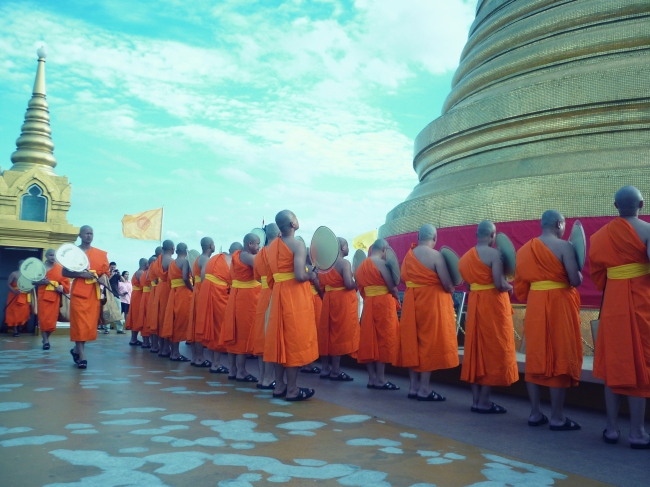Bangkok is a place which remains etched on the memories of all who visit it; a place of mind-bending surprises and eye-watering juxtapositions. It is a frenetic circus of bustling markets, spicy food and neon-lit clubs. It is also a tranquil space of stunning temples and beautiful architecture. This year Bangkok is the world’s most-visited capital city,[1] and with such a varied landscape, no wonder many travelers start their Asian adventure with a stint in the country’s animated capital. But how easy is it to stay in a place known to some as ‘scam city’? According to Sarah Peth, Senior Pro Consul in Bangkok, 180 British nationals were arrested and 231 hospitalised in Thailand last year [2] – but should this really act as a deterrent for those on a quest for Thai culture?
Khao San Road is Bangkok’s backpacker hub, where you can zig-zag between raucous bars and street performers, haggle for clothes or indulge in a street massage and watch the world unfold before your eyes. The food carts perched on the pavements offer a diverse selection of Thai cuisine; huge portions of pad thai (flat noodles with chilli and egg) for around 60p, and mouth-watering tropical fruit kebabs. Just make sure meat dishes are served piping hot, and the fruit and vegetables fresh. If you’d prefer a fine dining experience, Bangkok’s restaurants boast a plethora of global food; three courses and a cocktail is less than £10 – and that’s at the top end of the scale!
The shopping experience in Bangkok is unlike any other. The Kaoh San Road market is an overwhelming display of the trashy and tremendous where you can find anything from tie dye t-shirts to knock off DVDs. Don’t be afraid to haggle but always be respectful -Thai people don’t like losing face. The Chatuchak Weekend Market’s half an hour from the city centre and offers a slightly more authentic shopping experience, so set aside a few hours if you want to explore this 35-acre market-maze which sells snakes and second-hand items.
Getting around Bangkok can leave tourists susceptible to the most popular scams. Three-wheeled open door taxis called tuk-tuks are popular amongst tourists, but always agree on a price before you hop in. Emilia, a student at Oxford Brookes University was caught out by a local tuk-tuk scam.
She said: “On our first day in Bangkok, a man selling maps told us that the best way to see the city was by tuk-tuk. He brought us over to one of the cars and agreed a price with the driver – about 20p for the whole day which was so cheap.”[3]
Unfortunately this bargain price was too good to be true. The tuk-tuk driver took Emilia and her friends to the agreed place but also stopped off at a tailors, a jewellery shop and a fake tourist information shop where the girls were persuaded to make a booking for activities and handed over £170 each.
However upon returning home, they researched the information centre and found reviews advising them not to trust the shop. The girls had handed money over to an unofficial tourist agent called ‘ITAT’ – in Bangkok the official tourist bureau is called ‘TAT’, but Emilia and her friends had been brought into one of the many imitation shops which lure travellers in with fake logos and uniforms. A number of local businesses in the area work in conjunction with tuk-tuk drivers to increase tourist exposure to their shops, and drivers will often stop at places not originally agreed on the route or leave travellers in the middle of nowhere.
When Emilia and her friends returned the next day to demand a refund, the man with whom they had made the booking wasn’t there, and the other travel agents refused to hand back any cash.
It’s vital when travelling abroad that you research the local laws, customs and potential scams before you arrive. The FCO regularly updates its website with travel advice and helpful tips on every country around the world. There’s also information on how to plan and stay safe on your gap year.
More detailed advice is available on the FCO website at www.gov.uk/knowbeforeyougo and you can also follow them on Facebook (facebook.com/fcotravel) or Twitter (twitter.com/fcotravel).
For any of you who have a smartphone, there is a great free app called Plan.Pack.Explore which gives you all the info you might need before going. It is also available on their website at https://www.gov.uk/government/news/plan-pack-explore-a-new-guide-for-travellers.
Know Before You Go.
[1] http://www.bbc.co.uk/news/magazine-23433149
[2] Sarah Peth, Senior Pro Consul in Bangkok, as interviewed 5th September 2013
[3] Emilia, a student from Oxford Brookes as interviewed October 4th 2013

Pingback: Getting Scammed in Bangkok - Twice - TLITS DEV